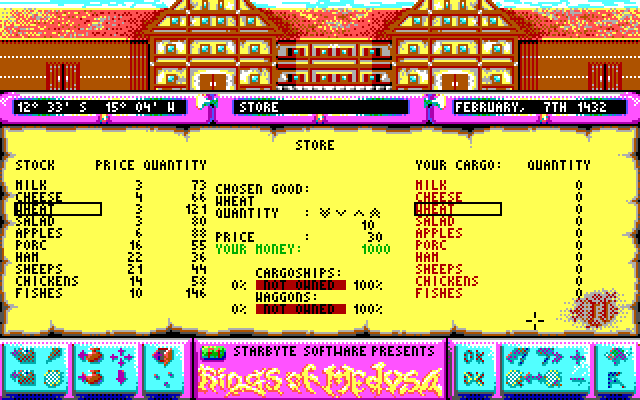Retro Replay Review
Gameplay
Rings of Medusa offers a multifaceted gameplay loop that skillfully blends strategy, light role-playing, and business simulation. From the outset, players are plunged into a medieval economy where trading goods between towns is not only profitable but essential for resource accumulation. This economic layer demands careful planning: buying low in one region and selling high in another can yield substantial funds, but market prices fluctuate based on supply and demand, keeping every trade route dynamic and challenging.
(HEY YOU!! We hope you enjoy! We try not to run ads. So basically, this is a very expensive hobby running this site. Please consider joining us for updates, forums, and more. Network w/ us to make some cash or friends while retro gaming, and you can win some free retro games for posting. Okay, carry on 👍)
Beyond commerce, the game ushers you into bounty hunting and treasure-seeking missions that add variety to the core experience. Each bounty hunt introduces unique foes—bandits, mercenaries, and mythical creatures—while treasure hunts take you across rugged terrain in search of hidden caches. These side activities are not mere time-fillers; they provide the critical capital needed to raise and maintain a formidable army capable of confronting Medusa’s forces.
Strategic battles form the heart of Rings of Medusa’s combat system. You’ll manage troop movements on a hex-based map, positioning infantry, cavalry, and archers to exploit flanks and terrain advantages. Occasional real-time arcade sequences—sword duels and sea battles—break up the strategy with fast-paced action. These sequences, while simple by modern standards, inject adrenaline into the storyline and give a tangible sense of personal heroism.
As you progress, recruiting generals and upgrading units become pivotal. Generals bring special abilities—morale boosts, healing a percentage of casualties, or enhanced movement—so selecting the right commander for each campaign is critical. Unit upgrades, from chainmail to plate armor or arbalests replacing shortbows, ensure that your forces evolve in step with Medusa’s growing power. This RPG-lite progression adds depth without overwhelming newcomers to the genre.
Finally, the hunt for the five magical rings ties the disparate gameplay threads together. Each ring is guarded by a formidable mercenary army, turning every search into a mini-campaign. Scouting, intelligent resource allocation, and diplomatic decisions—like hiring neutral mercenaries or forming temporary alliances—become key factors in determining success. This overarching quest structure lends a satisfying sense of purpose to every trade deal, battle, and exploration mission.
Graphics
Despite its age, Rings of Medusa’s visual presentation holds a particular charm for retro gaming enthusiasts. The world map is rendered in clear, easily readable pixel art, with distinct town icons, forests, mountains, and coastlines. Color-coded regions help players quickly identify safe trade zones versus dangerous territories patrolled by Medusa’s minions. This simplicity ensures that strategic decisions remain front and center, without being clouded by overly complex visuals.
Battle screens switch to a side-view schematic where your troops are displayed in rows. Unit sprites are small but expressive, and each type—be it spearmen, crossbowmen, or cavalry—has a recognizable silhouette. The limited animation, such as swinging swords or charging horses, keeps processing demands low while still conveying the chaos of medieval warfare. Special effects, like arrows raining down or magic blasts from enemy wizards, add flair without detracting from tactical clarity.
Arcade sequences—sword fights and sea battles—employ slightly larger sprite work and more fluid animations. The sword duels feature your prince dueling blade-to-blade with villainous lieutenants, while ship-to-ship encounters showcase rolling waves and cannon fire in basic but effective detail. These segments stand out visually from the rest of the game, acting as mini-set pieces that break the strategic pace with a burst of action and color.
The user interface strikes a balance between functionality and thematic cohesion. Menus for trading, army management, and quest logs are bordered by ornate medieval motifs, yet the text remains legible and navigation intuitive. Tooltips clearly explain item statistics, troop movement ranges, and ring properties, allowing seasoned strategists and newcomers alike to make informed choices.
Overall, while modern gamers might find the graphics dated, Rings of Medusa preserves the aesthetic of early ’90s PC strategy titles. It’s a testament to how thoughtful design and clear visual language can create an immersive world, even with pixel-limited art and modest color palettes.
Story
The narrative premise of Rings of Medusa is classic high fantasy: an evil sorceress, Medusa, has usurped the throne of a medieval kingdom, plunging the land into despair. As the exiled prince, you carry the weight of your father’s legacy and the hopes of the people. Early exposition scenes sketch out the bleakness of Medusa’s reign—townsfolk living in fear, once-prosperous markets now deserted, and rumors of monstrous creatures haunting the wilderness.
Quest dialogues introduce a cast of supporting characters, from tough-talking merchants who teach you the ropes of trading to battle-hardened mercenary captains who offer to swear fealty—for a price. While character portraits are simple, their personalities shine through in witty lines and moral dilemmas. Should you undercut the price of a struggling village’s grain to make a profit, or maintain fair prices to bolster local loyalty? These choices carry more narrative weight than you might expect in a strategy game.
The central storyline revolves around locating five magical rings scattered across the realm, each imbued with powers to vanquish Medusa’s dark magic. As each ring is retrieved, the game punctuates your triumph with narrative beats—rescued villagers celebrating, castles liberated, and once-cursed forests returning to life. This incremental progression keeps motivation high and makes every victory feel meaningful.
Subplots enrich the main quest, including a rivalry with a treacherous general who might betray you for a higher bidder, and a mysterious hermit claiming knowledge of Medusa’s origin. Although these threads are not deeply explored, they add thematic layers and inject unpredictability into your journey. Occasional bridge conversations and tavern tales flesh out the world, giving a sense of medieval society beyond pure conquest.
While the story’s themes—redemption, legacy, and the struggle against tyranny—are familiar, Rings of Medusa weaves them into gameplay effectively. The stakes remain personal: you’re not just amassing power for glory, but reclaiming a homeland stolen by dark sorcery.
Overall Experience
Playing Rings of Medusa feels like delving into an early era of hybrid gaming, where developers experimented with blending genres to keep players engaged. The interplay between trading economics, strategic warfare, and light RPG elements ensures that no two gaming sessions feel identical. With multiple ways to earn money—trade, bounties, or treasure dives—you can tailor your path to suit your strategic preferences.
Pacing can sometimes lag, especially when long trade routes become repetitive or when the player must wait for army recruitment. However, the diversity of activities—switching between economic management, mercenary skirmishes, and arcade sequences—mitigates potential monotony. For modern players, these slower stretches serve as an invitation to refine long-term strategies and plan the next major push against Medusa’s forces.
Rings of Medusa’s learning curve is moderate. While newcomers might need time to grasp price fluctuations or optimal troop formations, thorough in-game tooltips and a straightforward interface make the transition smooth. Veterans of strategy and simulation games will appreciate the depth beneath the retro veneer, while RPG fans can enjoy character progression through ring acquisition and general recruitment.
Replayability is strong: different trading strategies, mercenary alliances, and order of ring recovery can lead to varied endings and challenges. You may choose to invest heavily in naval strength one playthrough, focusing on sea dominates, or specialize in land-based armies in another. These divergent tactics reshape mid- and late-game battles, offering fresh challenges on subsequent journeys.
In sum, Rings of Medusa stands as a resilient classic for players who appreciate a multifaceted approach to medieval conquest. Its strategic depth, woven with business sim intricacies and occasional arcade thrills, offers a satisfying quest to retake a kingdom from a powerful sorceress. If you’re intrigued by retro strategy games with a touch of role-playing flair, this title remains a compelling ride through swords, sorcery, and savvy trade deals.
 Retro Replay Retro Replay gaming reviews, news, emulation, geek stuff and more!
Retro Replay Retro Replay gaming reviews, news, emulation, geek stuff and more!









Reviews
There are no reviews yet.